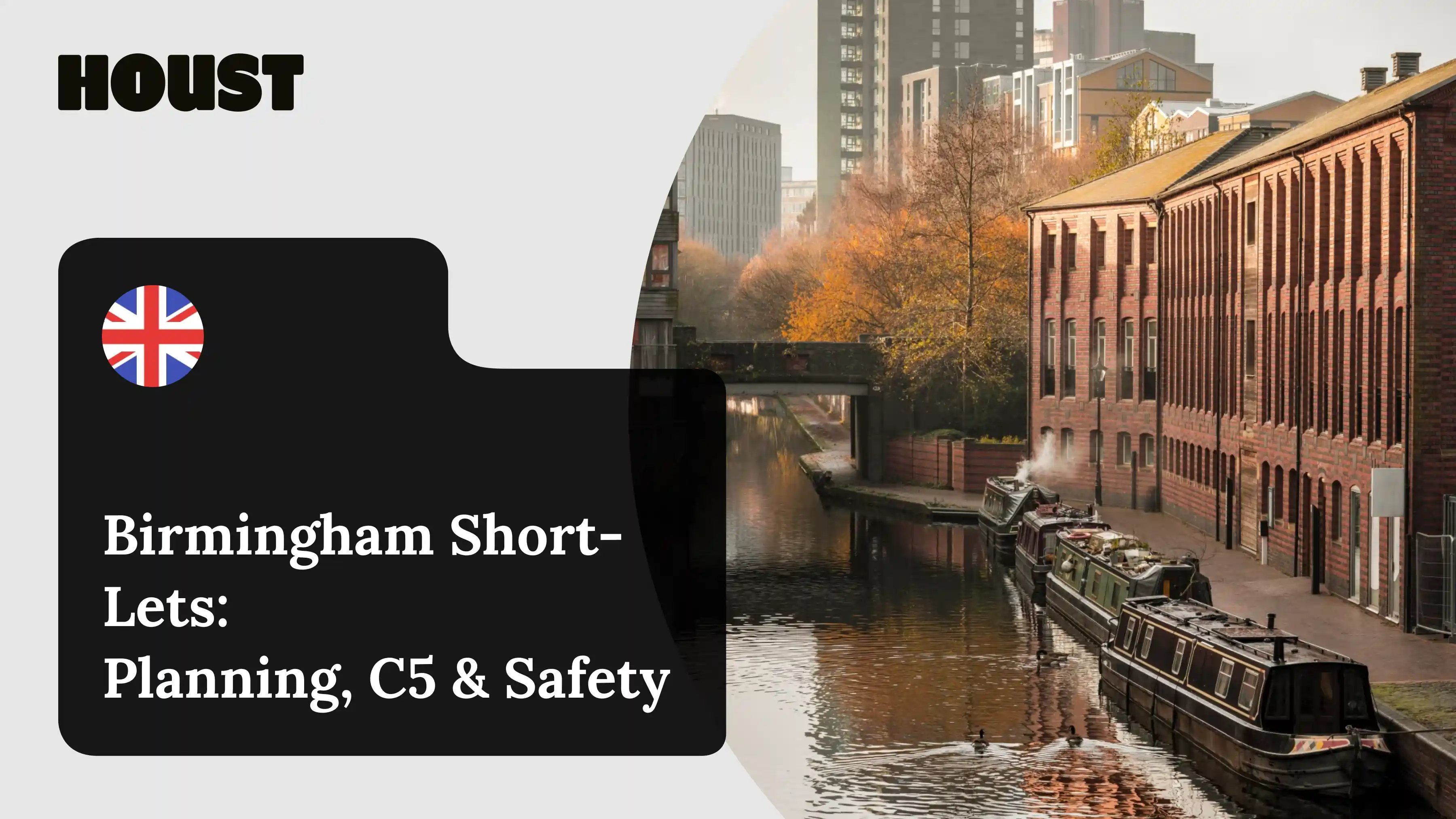TL;DR
- Birmingham has no citywide night cap. London’s 90-night rule does not apply here.
- Whole-home short-lets are planning led and can be treated as a material change of use, decided case by case.
- England has confirmed a new C5 use class and a mandatory national register, but neither has commenced yet.
- Hosts must complete a fire risk assessment and keep it up to date.
- If your property is available for at least 140 days and actually let for at least 70 days, it may be assessed for Business Rates instead of Council Tax.
Table of Contents
Is short-term letting legal in Birmingham in 2025?
Yes — but it’s planning-led and case-by-case. Using a dwelling (Use Class C3) as an entire-home holiday let/serviced accommodation can amount to a material change of use, typically assessed against intensity, amenity impacts, servicing and local policy; permission may be required depending on the facts. A neutral explainer outlines this England-wide approach.
What’s changing nationally (confirmed; not yet commenced)
England has confirmed a package for short-term lets:
- A new use class (C5) and planning permission for future STRs where applicable.
- A mandatory national register operated by DCMS.
- Proposal that homeowners can let their main home up to 90 nights without planning (outside London) once commenced. Implementation requires secondary legislation; councils may use Article 4 to remove any C3↔C5 permitted development in specific areas.
Birmingham angle
- Expect a clearer planning status for entire-home STRs (C5) once commenced.
- Track Birmingham City Council updates: the council already operates a city-wide Article 4 Direction for HMOs, showing active use of A4 powers; as of Sept 2025 there is no Article 4 for STRs published.
Contrast with London: the 90-night cap is Greater London-only; Birmingham has no citywide cap and relies on planning control.
🚀 Build a Thriving Airbnb Business with Houst
Monetize short-term rentals without owning property. Our Airbnb Business Partnership Program helps you start, scale, and automate a profitable Airbnb business with smart pricing, automation, and expert support.
💡 No Property Needed
📈 Expert Growth Strategies
🤖 Automated Hosting Tools

⭐ Rated 4.8/5 by 2,500+ Hosts

🧼 Airbnb Cleaning & Turnovers, Done Right

⭐ Rated 4.8/5 by 2,500+ Hosts

Tax & rating: when a Birmingham STR moves to Business Rates
Self-catering/holiday lets are rated non-domestic if available ≥140 days and actually let ≥70 days in the previous 12 months (England). Then the VOA sets a rateable value; reliefs (e.g., SBRR/RHL) depend on current schemes and value thresholds. If you do not meet 140/70, you remain on Council Tax (second-home premiums may apply locally).
🚀 Build & Grow Your Airbnb Business with Houst
Turn your expertise into a profitable Airbnb business — without owning property.
Join Houst’s Airbnb Business Partnership Program to start, manage, and scale with ease. Get expert support, automation tools, and smart pricing strategies to maximize earnings and grow faster.

⭐ Rated 4.8/5 by 2,500+ Hosts


⭐ Rated 4.8/5 by 2,500+ Hosts

Fire & safety: what Birmingham hosts must do (England)
All paying-guest accommodation must comply with fire safety law. For typical small STRs, follow the Home Office guide “Making your small paying-guest accommodation safe from fire” (with checklists):
- Do a fire risk assessment and review periodically.
- Provide detection & alarm; keep escape routes protected/clear.
- Install/maintain CO alarms where required.
- Provide a fire blanket (and extinguishers where proportionate).
- Test/maintain systems; keep maintenance logs and guest info visible.
Want a simple summary of caps, planning and safety just for this city?
Mini How-To: Stay compliant in Birmingham (step-by-step)
- Map your use today — If you’re running an entire-home holiday let/SA, assume the council may view it as a material change of use depending on intensity/impacts; gather evidence (booking frequency, turnover/management plan, neighbour-amenity measures).
- Check the roadmap — Plan for C5 and the national register (not yet commenced). Watch for any Article 4 consultations that could restrict C3↔C5 PD.
- Fire safety now — Use the Home Office guide to complete a risk assessment; fix gaps; keep a log and provide guest safety info.
- Rates & tax — If you meet 140/70, expect Business Rates (check VOA valuation approach and any current relief schemes). If below, Council Tax applies. Keep availability and lettings evidence.
- Neighbourliness/amenity — Clear house rules, waste plan and quiet-hours reduce complaints (a planning risk) and support any future application.
- Re-check annually — National rules are evolving; revisit planning/rating/safety each year and before scaling.
Curious how Birmingham fits into England-wide changes like C5 and the national register.
FAQs
Is there a 90-night cap in Birmingham like London?
No. The 90-night limit is specific to Greater London. Birmingham is planning-led and case-by-case.
Do I need planning permission to run an entire-home Airbnb?
Possibly. Whole-home STRs can amount to a material change of use depending on intensity/impacts; permission may be required. Pre-application advice helps.
What is the new C5 use class?
A dedicated short-term let use class for England alongside a mandatory register; commencement and mechanics are via secondary legislation. Councils can restrict C3↔C5 PD using Article 4 where justified.
Will I have to register my Birmingham STR?
Yes — once the national register commences, registration is expected to be mandatory (watch DCMS updates).
When do I move from Council Tax to Business Rates?
When the property is available ≥140 days and actually let ≥70 days in the previous 12 months; otherwise you remain under Council Tax.
What safety standards apply?
Follow the Home Office small paying-guest accommodation guide: risk assessment, alarms, escape routes, CO alarms, fire blanket, and maintenance logs.
Not Advice: This guide highlights key points for short-term letting and is not legal or tax advice. Rules change — always check the relevant authority’s website for your property and seek professional advice if unsure.
.webp)
.webp)
🚀 Start & Scale Your Airbnb Business with Houst
Join Houst’s Airbnb Business Partnership Program to start, manage, and grow your short-term rental business. With expert marketing, automation tools, and dynamic pricing strategies, we help you maximise earnings and scale faster.

⭐ Rated 4.8/5 by 2,500+ Hosts







